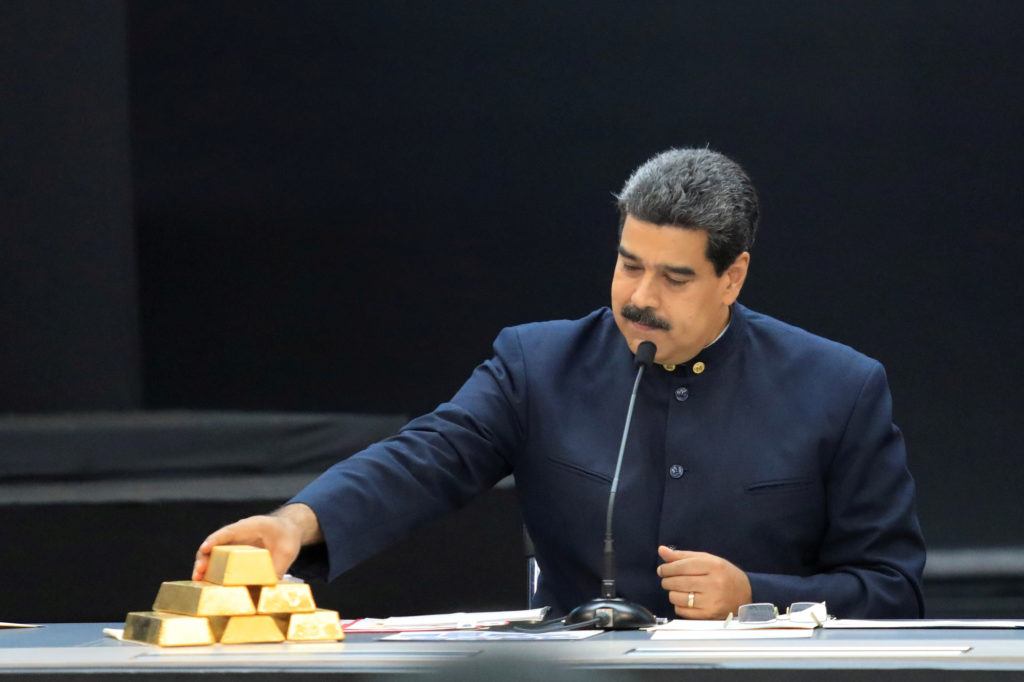Maduro’s Master Plan for Venezuela: Swapping 29 Tons of Gold for Euros with the UAE

Controversial Venezuelan president Nicholas Maduro has been widely criticized for overseeing Venezuela's worst-ever economic crisis. | Source: REUTERS/Marco Bello/File Photo
Venezuela is moving a shipment of 29 tonnes of gold, worth approximately 1 billion Euros or 1.2 billion dollars, to the United Arab Emirates for sale. UAE will pay cash Euros for the trade, which has riled US officials currently engaged in dethroning Socialist President Nicolas Maduro. 3 tonnes were already shipped on January 26th, according to a source speaking exclusively to Reuters .
Euros for Liquidity
After a record financial crisis in the South American country, compounded by decreased oil production, the Venezuelan government plans to use the Euros to ensure liquidity for international trading. Trading has been all the more complicated thanks to US sanctions. The sanctions gun may now switch aim to the UAE and anyone else who transacts in Venezuelan gold, according to Senator Marco Rubio of Florida:
The US presently backs an alternative Venezuelan leader named Juan Guaidó. The US government is pressing harder and harder for Maduro to resign, which he has refused to do. Reports of government repression and general disorder have been flowing out of the country.
The move is a departure from former President Hugo Chavez’s stance that Venezuela should have control of its physical reserves. Reuters says that in 2011, Chavez recalled 160 tonnes of gold from foreign possession.
Venezuela has also reportedly offered to pay off Russian debts with gold. As CCN.com’s Christina Comben writes:
The reputable news source reported that Guerra had “dropped a bombshell on Twitter,” saying that the Russian Boeing 777 that landed in Caracas on Monday was there to “spirit away 20 tons of gold from the vaults of the country’s central bank.”
However, it seems the answer might be that a Russian jet is transporting the gold to the UAE for sale.
A 6-Year Hell for Venezuelans Nears Its End?
Both the price of oil and its production have steadily gone down for Venezuela since Maduro took office in 2013. A strict socialist, his government has printed money so extensively that Venezuelans have reportedly suffered from 1 million percent inflation. The situation has made ample opportunity for cryptocurrency enthusiasts to assist merchants and citizens transacting in the country.
Venezuela is one of a number of countries which has created a state-backed cryptocurrency. The Petro has yet to do any economic wonders for Venezuela. Iran launched its own cryptocurrency in an effort to guarantee liquidity and facilitate international trade. Other countries like Russia, the United Arab Emirates, and Saudi Arabia have also considered or enacted similar plans. Existing decentralized blockchains would have great difficulty facilitating the transactions of even a small country, their capacity and “scaling” plans still very much in development.
In an attempt to re-stimulate the economy, the Venezuelan government is reportedly going to slow down its subsidy-sales of basic goods such as rice and toilet paper. The move will open up these markets for regular merchants, badly in need of stable sources of income. The Euros will supposedly be distributed to merchants and importers to enable them to pay for international goods. According to Reuters:
In a possible explanation for the hunger for euros, which are subject to less restrictions than dollars, the central bank told private banks this week they should supply euros to private importers, banking and business sources said.
These efforts are the last gasps of an administration which has found itself on the wrong side of US foreign policy. While the Presidency of Nicolas Maduro is likely doomed, the long-standing socialist bent of the Venezuelan government could be in a reshuffling phase.
Businesses might in the near future look forward to an economy with lifted sanctions (once Maduro is gone) as well as lighter government restriction. Job creation and economic stabilization would like follow. The fate of the Venezuelan bolivar remains in question, as well as that of the Petro. The country may have to scrap its whole economic system and start from scratch in the wake of legendary economic crisis.